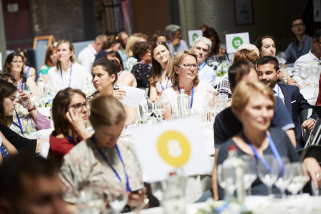Portfolio |
European Feed Manufacturers’ Federation (FEFAC) Responsible Soy Benchmarking Tool
Benefits
In 2021 a new version of the FEFAC Responsible Soy Benchmarking Tool was launched, which is an upgrade from the first version, launched in 2015. This online portal allows compound feed manufacturers, as well as other chain partners and stakeholders, to see which responsible soy schemes and programmes are in compliance with the FEFAC Soy Sourcing Guidelines 2021, released in February 2021. The 2021 Guidelines, in combination with the benchmarking tool, mark another his significant step towards market transparency and mainstream market development for responsible soy production and trading.
Responsible soy scheme owners (e.g. soy farmer organizations, soy traders and other certification programmes) have the opportunity to compare their performance with the European feed industry’s requirements on responsibly soy production, including on conversion-free soy. They can opt for a detailed self-assessment module, which can generate confidential results that can be used to create a roadmap for making improvements, prior to submitting an official request to ITC to perform an official benchmark against the FEFAC Soy Sourcing Guidelines 2021. All web-users can make side-by-side comparisons and view in-depth information of the schemes and programmes that have passed the benchmarking process. Tailor-made algorithms help ensure that priority areas are automatically highlighted.

“We have full confidence in T4SD to assess and publicly show how suppliers of responsible soy compare to our common feed industry requirements in terms of good agricultural practices, responsible workers’ rights and environmental stewardship.”
Background
Protein sources are an essential part of a balanced diet for food-producing animals and for European markets importing soybean meal has been necessary for many years already. Despite ongoing efforts to seek alternative protein sources, this reliance on imports is unlikely to change in the short to medium term. The increase of soy cultivation in the past decades has led to pressures on natural eco-systems in South America however, and FEFAC was requested by its members to develop tools that could help compound feed manufacturers ensure to source responsibly produced soy.
FEFAC developed the Soy Sourcing Guidelines in an effort to facilitate market transparency on responsible soy production that meets EU feed industry requirements. By facilitating access to the market offer of responsible soy by schemes and programmes, the Guidelines have attempted to allow the feed industry’s upstream and downstream value chain partners to meet in the middle. The 2021 version of the FEFAC Soy Sourcing Guidelines include criteria on the production of ‘conversion-free soy’, linking up with current market and political expectations.
Collaboration
The FEFAC Soy Benchmarking Tool, developed and launched by T4SD in collaboration with FEFAC, allows standard setting organizations that certify responsible soy or other programmes to benchmark their requirements and criteria against FEFAC minimum requirements for responsible and conversion-free soy. ITC independently performs the benchmarking exercise, making use of the ITC Standards Map database, thereby making in-depth information about existing standards and programmes readily available on the site. Dedicated benchmarking portal provides detailed benchmarking analysis and equivalence assessments. The new version of the FEFAC Soy Benchmarking Tool also displays the programmes that offer carbon-footprint information and No Land Use Change certificates (20 years), however the quality of these programme features are not verified by ITC or FEFAC. The infrastructure provided by the T4SD team, combined with FEFAC’s guidelines, contributes to the transition towards a mainstream supply of responsibly produced soy.
Note: It is important to take note that in the end the standard owner or company is responsible for its own responsible soy programme. FEFAC can – via ITC – assess whether the procedures for verification are in order and likely to lead to credible results, but will not send its own auditors into the field. When there is information that compliant schemes are not performing well, this information will be taken into account by FEFAC.
Responsible Soy Declaration
In May 2019, FEFAC and the International Trade Centre created the possibility on this webpage for feed companies & national associations to state their voluntary commitment to sourcing responsibly produced soy products. As part of their commitment, feed companies agree to take specific actions to ensure that by 2025 the soy used in compound feed manufacturing, from home-grown and imported origins, meets criteria laid down in the FEFAC Soy Sourcing Guidelines. The Responsible Soy Declaration with signatory list can be downloaded here.
Compliance with Soy Sourcing Guidelines 2015
A list of the schemes and programmes that passed the benchmarking process against the FEFAC Soy Sourcing Guidelines 2015 can be found here. As from 1 January 2022 FEFAC will remove all communication related to the benchmarking results of schemes/programmes against the 2015 version of the FEFAC Soy Sourcing Guidelines. As from that date, schemes/programmes are requested to only communicate “compliance with the FEFAC Soy Sourcing Guidelines” when this is in relation to the 2021 version.
The project
Partnership Objective
Launched
Sector(s):

Partners

Funded by

Selected projects
More in our portfolio
EU City Award
Showcase how EU cities set an example by having a global impact on sustainable, fair and ethical trade through local efforts.
EU Cities for Fair and Ethical Trade Award
The Award recognizes visionary EU cities which show leadership, and helps connect cities to exchange knowledge and share good practices in order to scale up cities’ efforts and their contribution to the Sustainable Development Goals.
eco.business Fund Sustainability Standards Self-Assessment Tool
The eco.business Fund and the International Trade Centre have joined forces to enable businesses assess compliance against sustainability standards and potentially access preferential bank loans based on their sustainability score




